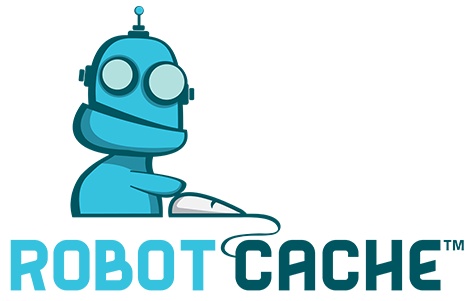In recent months, rarely does a day go by without journalists in the games and tech space getting a press release about a brand new company that's using the blockchain or cryptocurrency to 'revolutionise' a sector. It's almost become an industry in-joke.
But the announcement of Robot Cache last week certainly turned our heads. This is a brand new decentralised PC games storefront being set up by InXile creator and industry veteran Brian Fargo, that uses blockchain tech and its own cryptocurrency. Yep, lots of buzzwords that it's hard to not roll your eyes at, but having spoken to Fargo himself, there's actually a fairly strong case for the blockchain being used in digital retail.
The idea started when Fargo was pretty much told by investors to try something with this new technology in the games space.
"I have some friends that are very heavy into the cryptocurrency space, they're very successful. They said would back me if I was to come up with something that would work well in the video game space," he tells PCGamesInsider.biz.
"I sat back and thought about it and started reading a lot of whitepapers to get an understanding of what the impact that the blockchain can have on what we do. One of the reoccurring themes that came up over and over again is the reduction for the need for a middleman. What's the most interesting middleman in our industry - digital distribution. Also, server costs have come down greatly over time and it doesn't really take that much to operate that kind of business. That was part one that I started thinking about.
"The other part was the secure nature of the blockchain. One of the things it does really, really well is that it can near guarantee that something can't exist in two places at once otherwise, cryptocurrency would have no value. If we could have the same bitcoin, it would all fall apart instantly. The whole verification process to ensure that one coin cannot exist in two places is something that it does really, really well, better than any system in my opinion. That started making me thinking about chain of ownership, that we could definitely trace a product and who had it in their library. With those two things put together, I thought let's try a different paradigm shift for distribution, so that got me thinking: "Let's offer developers 95 per cent of the pie which is great but the consumer doesn't really care that the developers get higher margins. What's good for them? So that's where I started thinking about the resell part of it. GameStop is a great model to look at - people are used to that sort of thing. I knew that it was a model that people were comfortable with. That's really how it all came about."

To date, the only company that Robot Cache has revealed its working with is Ark: Survival Evolved creators Studio Wildcard. More are set to be announced in the near future, with Fargo claiming to be in late discussions with a number of game makers, both triple-A and indie.
The pitch to developers and publishers is pretty simple - make 95 per cent of revenue on new games, and 70 per cent on resold titles (consumers selling the games get 25 per cent in Robot Cache's IRON cryptocurrency, which can be cashed out for real money. The other five per cent in both instances goes back to Robot Cache).
"It's a compelling pitch, because if you take, for example, a game that sells one million copies, the margin swing for a publisher getting 95 per cent is an extra $6m to their bottom line," Fargo says.
"So that's a huge swing. For an indie publisher, who maybe only generates $100,000 of revenue, that extra $20,000 could be a make it or break it for them to try and again. From that perspective, you can see it's a compelling pitch. You'll see some announcements soon. Studio Wildcard is on board. There will be an announcement of the other ones later."
One side effect that publishers might enjoy from this application of blockchain technology is that in tracking the ownership of a game license, it effectively acts as DRM for their products.
"The blockchain acts as the DRM effectively," Fargo says.
"You can't have DRM-free and resell in the same thing otherwise it doesn't work. In order for us to facilitate the resell, the product has to be tracked on the blockchain. That very aspect of it is the very thing that allows people to resell their games. We think it's well worth the trade-off. Right, and they get remunerated if it gets relicensed. I just see it as a win for consumers and publishers."
With a game that sells one million copies, the margin swing for a publisher getting 95 per cent is an extra $6m to their bottom line. For an indie publisher, who maybe only generates $100,000 of revenue, that extra $20,000 could be a make it or break it for them to try and again.
Fargo says that Robot Cache isn't going to just be another Steam key reseller, but will be its own store and client. He's also hoping to draw in exclusive content to attract people to the storefront.
"We will offer some different kinds of things, we will find our way to what users really love to see more or less of," he says.
"We're also different is that our intention is to use some of the money we raise to do exclusive deals with people for exclusive content. We don't necessarily think that people are going to put their product on our site - not with Steam having a massive share of the business, but maybe they'd give us an exclusive map or material or something like that. We think there are some ways to entice publishers to give us some exclusive content."
Based on the outfit's own research, Fargo says that there will be some element of curation on the store.
"We intend to heavily work with the community on multiple fronts. One thing that has come back very consistently and I've done some polling myself and I've had feedback is that they, by and large, want to see curation of some kind," he explains.
"The feeling of 7,000 titles coming out... the tools for making games are so much easier these days. Any nine-year-old can make a Unity app and throw it up there. We believe there needs to be some kind of curation so that it doesn't become overcrowded and that malware doesn't get out there and so on. As for exactly how we're going to handle that, that's one of the things we want to work with the community on to figure out what everyone thinks is the right method. There's a lot of ways to handle that. The other part of it, that the community is going to love, is that there will be a great level of functionality to the site at launch. There will be other systems and API functions that are not available Day One. We're going to open source that for people and allow the audience to get in and help us build out the rest of the functionality of the site. We've seen that on multiple fronts. They like to be part of the building of it."

All of this sounds pretty positive for the people making games - they get more money from selling their wares new, they get to set the resale price on the products AND they get money from that side of the business. What's more, their products are going to be protected and will be on a storefront that isn't a total Wild West.
But the optics on the announcement aren't perfect. For one, it leans heavily on cryptocurrency, not exactly a 'safe' venture, particularly given how Bitcoin and other cryptocurrencies are crashing at the moment. The other red flag is in all caps at the start of the press release - CANARY ISLANDS. Yes, Robot Cache is based in a known tax haven. The way Fargo describes this happening is more of a 'happy coincidence' and points out that the company isn't unique when it comes to being located in such regions.
"A lot of that is under the hood for most people," he explains.
"You have businesses that started in one place and moved to another. EA's contracts are signed out of Switzerland. That's public, that's not a big shock. For one, our SVP lives in the Canary Islands and has a group of programmers already there up and running. That's one thing to consider. We ended up in the Canary Islands because he's living there with a group of developers. We knew we wanted to be set up internationally somewhere because we are going to get over half our revenue from outside of the US so it made sense to set up outside of the US. Our SVP already lives there with a group of developers. That's how the Canary Islands came about."
Robot Cache is set to launch in the second quarter of 2018. For the company's first year, Fargo's aims are simple - to build a community around the storefront and find its niche. He even sees indie storefront Itch.io as confirmation that finding your niche can make for a profitable business in the current games retail landscape.
"I'd say the ambition for the first year is that we have some of the top content on the site so that we're seeing as an offering of triple-A products, and that we have a community that's loving the experience," he says.
"That's the most important thing, we have to have a community loving it. Someone like Itch.io does a lot of traffic - that community loves what they're offering there. They take less than a ten per cent commission. You can pay zero there if you want. There's a site that's running and operating, it's not taking a big fee, you have an audience that loves what they're offering. We look at that and know that you can carve out your own niche in the business, and we'll be pivoting along the way to find what people react most positively towards."
He continues: "We have to have the top titles in order to compete. Our niche, so to speak, is going to be a different kind of user experience on the site in terms of how it's gamified. If we do a good job, we'll get a really loyal audience that likes the ability to earn money or get games or get money from their games in ways that other sites don't offer."













